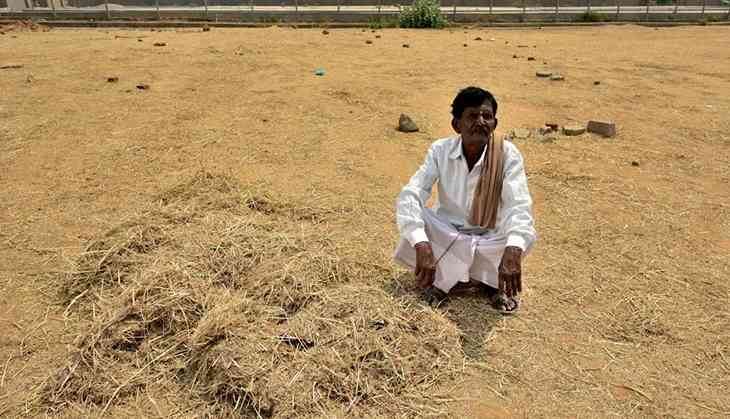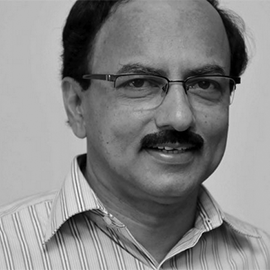Karnataka wants to draw paleo-fossil water. You are not the only one who thinks it's absurd

Karnataka is going through its worst drought in 40 years, leading to acute shortage of water, both for drinking and irrigation purposes.
But a freakish and dangerous solution that the Rural Development and Panchayat Raj Minister HK Patil is keen to adopt has drawn considerable flak from scientists and the general public, but he is not ready to give up – as yet.
In times of crisis, conmen come up with all types of solutions, but wise people know what to choose, or so they say.
Patil has obtained the Cabinet’s approval for this so-called ‘Pathala Gange’ project, to be taken up on an experimental basis.
Clearly, rocket science
WaterQuest Hydro Resources Management Works, an American company, claiming to have expertise in subterranean exploration, has come forward to lift sufficient water from deep under the earth’s crust.
In a presentation made to the state government, the company representatives said they had developed a ‘novel technology’ to tap the ‘distillate’ that is generated when sea water enters the continental crust and takes the form of steam.
The steam then remains trapped in condensed pockets, which lie between 300 m to 800 m below the earth’s surface. They claimed that the drilling is supplemented by concrete casings and the wells can produce “up to 1 lakh litres of water per hour with no environmental impact” and it was “a perennial and sustainable” source of water.
The government has accepted WaterQuest’s proposal to take up exploratory work in 10 different places at a cost of Rs 12.48 crore each.
After the proposal leaked out, leading to a public furore, the minister called a meeting of scientists, geologists, environmentalists and the state officials for consultation.
Patil’s defence was that since the state faced water shortage quite regularly, there was a need to find alternative solutions.
“We have asked the company to do the drilling at one place and prove its technology. If water is not found, we will not make any payment. If it succeeds, we will use the technology as a contingency plan in drought-prone areas,” he said.
Tap 'distillate'... say what?
At the meeting, there were questions raised about the credibility of the company and the technology it claimed to have developed. “The saline water intrusion is seen closer to the coast and not some 300 km inland as the company claims,” said BC Prabhakar, a geology professor at Bangalore University.
H Chandrashekhar, former joint director of the Department of Mines and Geology, said categorically, “It is unscientific to think sea water enters the earth’s crust and forms into channels to be exploited later. They are trying to sell a fantasy.”
“Tapping steam underneath the earth is all bunkum. Hot water can take the form of steam only when it is exposed to outside environment. The company’s claim to produce 1 lakh litres of water per hour is laughable,” said Nagesh Hegde, an environmentalist.
Hegde points out that the company’s website gives very sketchy information about its performance and successes elsewhere, inspiring very little confidence in its ability to deliver on its promise.
Karnataka sits on the Deccan Plateau and the availability of water reduces as one digs deeper.
“Our borewells which have been dug up to 500 metres below the surface in some places, have given yields of just 18,000 to 20,000 litres, and never one lakh litres,” says KM Manjunath, the regional director of the Central Groundwater Board.
Old wine, new 'bunkum'?
Karnataka’s experiments with deep drilling for water is nothing new, as it is second only to Rajasthan in terms of drought-prone regions.
In Kolar and Tumukuru districts, for instance, borewells have been dug up to 2,000 ft depth, as water table has consistently been going down. Experts have called for a ban on further expansion of borewells.
Geologists believe that what WaterQuest is aiming to do is to tap paleo-fossil water, which has been trapped between rocks thousands of years ago, deep underneath the earth’s surface. It is possibly laced with arsenic, silica and sulphides and unfit for human consumption, they say.
Some of the participants also drew attention to the experiments conducted in Saudi Arabia in the mid-1980s in its quest for sustainable underground water.
Hundreds of deep wells were dug in Tubarjal province, going up to 5,000 to 6,000 ft in search of water. Though the water had salt content, the Saudi Arabian government installed desalination plants and was able to successfully grow wheat over thousands of acres in the desert region. At one point of time, Saudi Arabia even became the world’s fifth largest exporter of wheat.
But, when the wells suddenly began to dry up, wheat cultivation was down to a trickle. Today, Tubarjal presents the sight of a ghost town with its abandoned wells, rusting machinery and toxic waste.
Turning a deaf ear, blind eye
Even after hearing about Tubarjal’s fate, Patil reportedly maintained, “Similar thing may not happen here…We will give it a try and if it doesn’t succeed, we will ask the company to pack up and go.”
Chief Minister Siddaramaiah, who had initially backed Patil’s proposal, has advised the Rural Development and Panchayat Raj ministry to take up only a “pilot project” and organise a detailed assessment with experts before proceeding further.
Given his ‘Bhageerath-style’ determination to solve Karnataka’s water scarcity problems, Patil is also planning to take up a ‘cloud-seeding’ operation early July. The project, which has been criticised as unproven, is estimated to cost Rs 30 crore.
It’s not difficult to guess, as a wit said, why politicians love a drought!
Edited by Jhinuk Sen
First published: 22 May 2017, 12:56 IST

